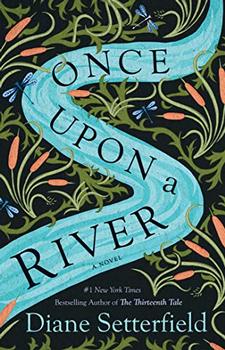Summary | Excerpt | Reading Guide | Reviews | Beyond the Book | Read-Alikes | Genres & Themes | Author Bio

This article relates to Once Upon a River
 Quietly the ferryman is a recurring character in Once Upon a River, a spectral presence that exists somewhere in between truth and fantasy. Radcot's denizens, many of whom believe they have spotted Quietly on the Thames, have constructed dozens of versions of his story, but in essence he is described as "a man who comes and goes without warning, sometimes bringing life, sometimes death." While Setterfield's apparition appears to be plucked from her own imagination, Quietly does draw from legends and folktales of soul-carrying ferrymen throughout the ages.
Quietly the ferryman is a recurring character in Once Upon a River, a spectral presence that exists somewhere in between truth and fantasy. Radcot's denizens, many of whom believe they have spotted Quietly on the Thames, have constructed dozens of versions of his story, but in essence he is described as "a man who comes and goes without warning, sometimes bringing life, sometimes death." While Setterfield's apparition appears to be plucked from her own imagination, Quietly does draw from legends and folktales of soul-carrying ferrymen throughout the ages.
In Egyptian lore, the figure of Mahaf is sometimes depicted as the celestial ferryman who carries the dead to the underworld. This mythical character is heavily featured in the Pyramid Texts, the oldest known religious writing, transcribed on the walls of sarcophagi and pyramids to honor the passing of pharaohs. In one reference, a deceased person asks Mahaf to "ferry me across in this ferry-boat in which you ferry the Gods." In ancient Egyptian the term used to refer to ferrying someone across the river literally translates as "to unite the land"; in other words to bring the two shores of life and death together. Therefore to be ferried is in itself a symbol of passing into the underworld. This travel of the souls by ferries evokes the Egyptians' daily life on the Nile, where the sun would set and rise, boats would cross the river and the flowing waters would be the hub of work and life.
Greek mythology featured a similar character, Charon, the ferryman of Hades who carried souls of the newly deceased across the rivers Styx and Acheron that divided the world of the living from that of the dead. Many Greek tales mention that Charon required payment for this journey, and thus loved ones would place a coin in the mouth of the deceased to ensure safe passage to the underworld. This tradition came to be known as "Charon's obol." There is strong archaeological evidence to suggest that this practice was actually carried out, not merely a mythical fabrication. It was believed that, should the fee not be paid, the dead were left to wander the river's shores for 100 years. Among many esteemed mythical heroes to have traveled on Charon's boat and remained alive were Heracles, Odysseus and Theseus.
In Irish myths, Manannán mac Lir is a sea god who owns a boat called Scuabtuinne, which means "wave sweeper." Manannán was believed to be the guardian of the Blessed Isles, situated in the Atlantic Ocean, which were depicted as a winterless earthly paradise. The Celts thought that the Blessed Isles were the gateways to the "Otherworlds" where the soul journeys after death. As the guardian of these gateways between the worlds, Manannán was the ferryman who would transport the souls of the dead to the afterlife. Some say that the Isle of Man, which lies between England and Ireland, was named for this Celtic deity.
Painting of Charon by Alexander Litovchenko
Filed under Cultural Curiosities
![]() This "beyond the book article" relates to Once Upon a River. It originally ran in January 2019 and has been updated for the
July 2019 paperback edition.
Go to magazine.
This "beyond the book article" relates to Once Upon a River. It originally ran in January 2019 and has been updated for the
July 2019 paperback edition.
Go to magazine.
Your guide toexceptional books
BookBrowse seeks out and recommends the best in contemporary fiction and nonfiction—books that not only engage and entertain but also deepen our understanding of ourselves and the world around us.